(完整)六年级一般过去时
一般过去时 六年级英语知识点

一般过去时(小学)一、定义1.表示过去某个时间发生的动作或存在的状态。
如:She ate three apples yesterday. 昨天她吃了三个苹果。
I got up at 6:30 yesterday. 我昨天6:30起床。
My father was very busy last week.我父亲上周很忙。
2.表示过去经常或过去反复发生的动作(也可与often,always等频率副词连用)。
如:He always got up very early when he was young.年轻的时候,他每天总是起得很早。
二、谓语形式:动词的过去式(1)She was a student two years ago. 两年前她是一个学生。
(这件事情已经过去了,所以be动词is要用过去式was)(2)they were students two years ago. 两年前他们/她们是学生。
(这件事情已经过去了,所以be动词are要用过去式were)(3) Ann washed her clothes last night. 安昨晚洗了她的衣服。
(这件事情已经过去了,所以动词wash要用过去式washed)(4) I did my homework promptly. 我及时地完成了作业。
(这件事情已经过去了,所以动词do要用过去式did)三、句子结构:(a) be 动词的过去式句型: (b)动词过去式句型:(a) be 动词的过去式句型:1.肯定句:主语+be 动词(was , were)+其他,如:She was a student two years ago. 两年前她是一个学生。
2.否定句:主语+be not(was not, were not)+其他,如:She was not a student two years ago. 两年前她不是一个学生。
3.一般疑问句:Be动词(Was/Were)+主语+其他?肯定回答为“Yes,主语+was/were”,否定回答为“No,主语+wasn’t/weren’t”。
六年级四种时态总结
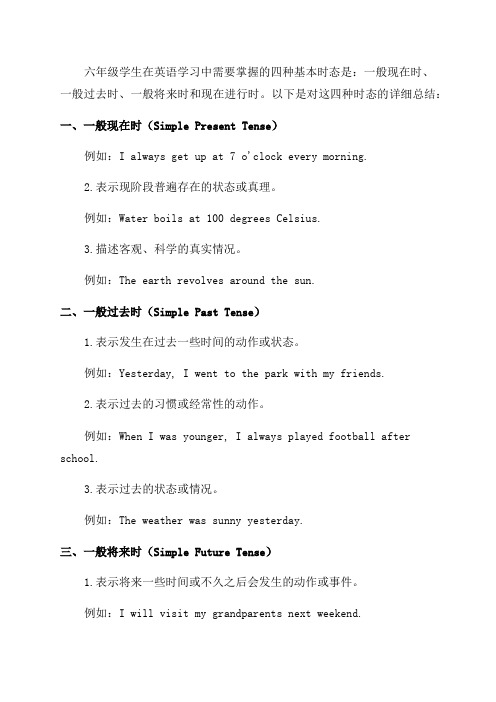
六年级学生在英语学习中需要掌握的四种基本时态是:一般现在时、一般过去时、一般将来时和现在进行时。
以下是对这四种时态的详细总结:一、一般现在时(Simple Present Tense)例如:I always get up at 7 o'clock every morning.2.表示现阶段普遍存在的状态或真理。
例如:Water boils at 100 degrees Celsius.3.描述客观、科学的真实情况。
例如:The earth revolves around the sun.二、一般过去时(Simple Past Tense)1.表示发生在过去一些时间的动作或状态。
例如:Yesterday, I went to the park with my friends.2.表示过去的习惯或经常性的动作。
例如:When I was younger, I always played football after school.3.表示过去的状态或情况。
例如:The weather was sunny yesterday.三、一般将来时(Simple Future Tense)1.表示将来一些时间或不久之后会发生的动作或事件。
例如:I will visit my grandparents next weekend.2.表示打算、计划或意图。
例如:I am going to study hard for the exam.3.表示预测、预言或非即刻发生的事情。
例如:It will rain tomorrow.四、现在进行时(Present Continuous Tense)1.表示现在正在进行的动作或状态。
例如:I am studying English now.2.表示临时的、目前的事情。
例如:She is staying at her friend's house this week.3.表示将来已确定的计划或安排。
一般过去时 六年级英语知识点

一般过去时六年级英语知识点一般过去时是表示过去某个时间发生的动作或存在的状态的时态。
例如,昨天她吃了三个苹果,我昨天6:30起床,我父亲上周很忙。
它也可以表示过去经常或过去反复发生的动作,常与often、always等频率副词连用。
例如,年轻的时候,他每天总是起得很早。
谓语形式是动词的过去式。
例如,两年前她是一个学生,这件事情已经过去了,所以be动词is要用过去式was。
另外,两年前他们/她们是学生,安昨晚洗了她的衣服,我及时地完成了作业,这些动词都要用过去式。
句子结构包括be动词的过去式句型和动词过去式句型。
在be动词的过去式句型中,肯定句的结构是主语+be动词(was,were)+其他,例如,两年前她是一个学生。
否定句的结构是主语+be not(was not,were not)+其他,例如,两年前她不是一个学生。
一般疑问句的结构是Be动词(Was/Were)+主语+其他?例如,两年前她是一个学生吗?肯定回答为“Yes,主语+was/were”,否定回答为“No,主语+___”。
特殊疑问句的结构是特殊疑问词+一般疑问句(顺序)?例如,她两年前是什么职业?Where were you yesterday。
I was at home.In the past tense。
there are three types of sentences: affirmative。
negative。
___ the structure of subject + past tense verb + other words。
For example。
"___ the structure of subject + did not + base form of verb + other words。
For example。
"She did not eat three ___ the structure of did + subject + base form of verb + other words + n mark。
(完整版)小学六年级英语一般过去时

第十七讲一般过去时一. 概念一般过去时表示过去某个时间发生的动作或存在的状态,常和表示过去的时间状语连用。
一般过去时也表示过去经常或反复发生的动作。
例句:1.I watched TV last night.我昨天晚上看电视。
2.What did you do yesterday?你昨天做了什么?3.They went to Beijing last year.他们去年去了北京。
二.用法1.表示过去发生的动作或状态,通常会有明确的表示过去的时间状语。
I went to the zoo yesterday.I stayed up last night.2.叙述过去连续发生的动作或状态。
This morning , I got up early , went out for a walk , then came back and cooked for my family .3.表示过去某一段不确定的时间内发生的动作或状态。
He worked in the store for 5 years.三.Be动词在一般过去时中的变化1. am 和is在一般过去时中变为was。
(was not=wasn't)2. are在一般过去时中变为were。
(were not=weren't)3. 带有was或were的句子,其否定、疑问的变化和is, am, are一样,即否定句在was或were后加not,一般疑问句把was或were调到句首。
四.句中没有be动词的一般过去时的句子1.否定句:didn't +动词原形,如:Jim didn't go home yesterday.2.一般疑问句:在句首加did,句子中的动词过去式变回原形。
如:Did Jim go home yesterday?3.特殊疑问句:疑问词+一般疑问句?如:What did Jim do yesterday?五.动词过去式变化规则1.一般在动词末尾加-ed,如:pull-pulled, cook-cooked2.结尾是e加d,如:taste-tasted3.末尾是辅音字母加一个元音字母和一个辅音字母的重读闭音节,应双写末尾的辅音字母,再加-ed,如:stop-stopped4.以“辅音字母+y”结尾的,变y为i,再加-ed,如:study-studied六.真题再现( ) 1. The boy the tree last week.A. is wateringB. watersC. watered2. I _____(see) his name in the newspaper yesterday.因为句中出现了表示过去的时间状语last week和yesterday,所以正确答案分别为:1. C2.saw精点精练一、用动词的适当形式填空。
六年级英语知识点时态
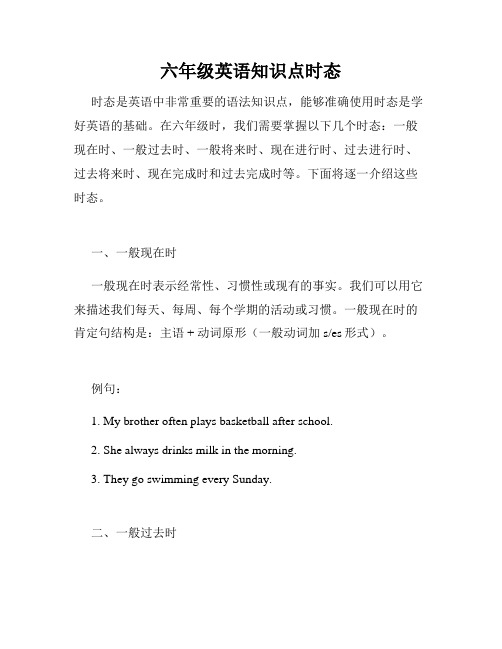
六年级英语知识点时态时态是英语中非常重要的语法知识点,能够准确使用时态是学好英语的基础。
在六年级时,我们需要掌握以下几个时态:一般现在时、一般过去时、一般将来时、现在进行时、过去进行时、过去将来时、现在完成时和过去完成时等。
下面将逐一介绍这些时态。
一、一般现在时一般现在时表示经常性、习惯性或现有的事实。
我们可以用它来描述我们每天、每周、每个学期的活动或习惯。
一般现在时的肯定句结构是:主语 + 动词原形(一般动词加s/es形式)。
例句:1. My brother often plays basketball after school.2. She always drinks milk in the morning.3. They go swimming every Sunday.二、一般过去时一般过去时表示发生在过去某个具体时间或某一段时间中的动作或状态。
一般过去时的肯定句结构是:主语 + 动词过去式。
例句:1. We went to the zoo yesterday.2. He played soccer last weekend.3. She studied Chinese history last year.三、一般将来时一般将来时表示将要发生的动作或存在的状态。
一般将来时的肯定句结构是:主语 + will + 动词原形。
例句:1. I will visit my grandparents next month.2. We will have a picnic in the park tomorrow.3. She will clean her room this evening.四、现在进行时现在进行时表示现在正在进行的动作。
现在进行时的肯定句结构是:主语 + am/is/are + 动词ing形式。
例句:1. They are playing tennis in the park now.2. She is reading a book at the moment.3. We are watching a movie.五、过去进行时过去进行时表示在过去某个时间点正在进行的动作。
新版PEP小学六年级英语下Unit2-复习(一般过去时)

What did she do?
She cooked a big meal.
What did he do?
He painted a picture.
Was the man at home yesterday?
No, he wasn’t . He was in the classroom.
Were they in the park?
What did the boy do after school yesterday ?
He played football.
What did he do after class yesterday?
He played basketball.
What did the man read?
He read newspapers.
Yes, they were.
Did the boy play basketball yesterday afternoon?
No, he didn’t . He played football.
Did the man cook breakfast this morning?
Yes, he did.
5. I ____(see) a film with Ann yesterday.
2. She _____ (be) at school this morning.
4. He _____ (do not) live in Guangzhou before 2000.
Exercise
1. _____(be) you busy yesterday afternoon?
Did she…?
Yes, she did.
六年级上册英语知识点归纳
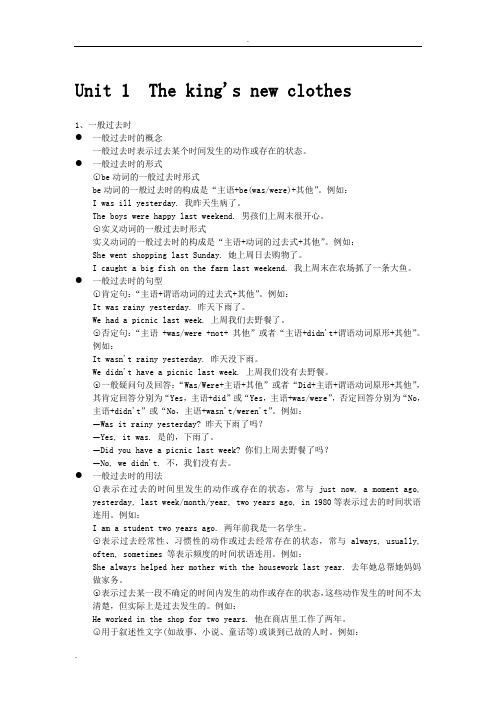
Unit 1 The king's new clothes1、一般过去时●一般过去时的概念一般过去时表示过去某个时间发生的动作或存在的状态。
●一般过去时的形式○1be动词的一般过去时形式be动词的一般过去时的构成是“主语+be(was/were)+其他”。
例如:I was ill yesterday. 我昨天生病了。
The boys were happy last weekend. 男孩们上周末很开心。
○2实义动词的一般过去时形式实义动词的一般过去时的构成是“主语+动词的过去式+其他”。
例如:She went shopping last Sunday. 她上周日去购物了。
I caught a big fish on the farm last weekend. 我上周末在农场抓了一条大鱼。
●一般过去时的句型○1肯定句:“主语+谓语动词的过去式+其他”。
例如:It was rainy yesterday. 昨天下雨了。
We had a picnic last week. 上周我们去野餐了。
○2否定句:“主语 +was/were +not+ 其他”或者“主语+didn't+谓语动词原形+其他”。
例如:It wasn't rainy yesterday. 昨天没下雨。
We didn't have a picnic last week. 上周我们没有去野餐。
○3一般疑问句及回答:“Was/Were+主语+其他”或者“Did+主语+谓语动词原形+其他”,其肯定回答分别为“Yes,主语+did”或“Yes,主语+was/were”,否定回答分别为“No,主语+didn't”或“No,主语+wasn't/weren't”。
例如:—Was it rainy yesterday? 昨天下雨了吗?—Yes, it was. 是的,下雨了。
—Did you have a picnic last week? 你们上周去野餐了吗?—No, we didn't. 不,我们没有去。
六年级一般过去时

did (do) the housework yesterday. 6.Sam_____ Did 7.______(do) you _______(enjoy) yourself enjoy yesterday? 8.______(do)you _________(play) the violin Did play yesterday? drew No, I didn't. I_____(draw)some pictures there. 9. I ______ (eat) a big pizza yesterday. ate 10.There____ (be) many sheep on the farm were Last year. 11. Iwatched ______ (watch) a cartoon on Saturday. 12. Her father _______ read (read) a newspaper last night.
(2) 。 III. 一般过去时的几种句型 肯定:主语+动词的过去式+其它。 如:He went to the toy store yesterday. 他昨天去玩具店了。 否定:主语+did not (didn't) +动词原形+其它。 如:He didn't go to the toy store yesterday. 他昨天没去玩具店。
一般过去时的一般疑问句的构成: Did+主语+动词原形+其它?如: 1) -Did you go to Beijing last week? -Yes, we did. (No, we didn't.) 一般过去时的特殊疑问句的构成: 疑问词+did+主语+动词原形+其它?如: 1) -What did you do last night? -I did my homework.
六年级英语一般过去时句子及翻译
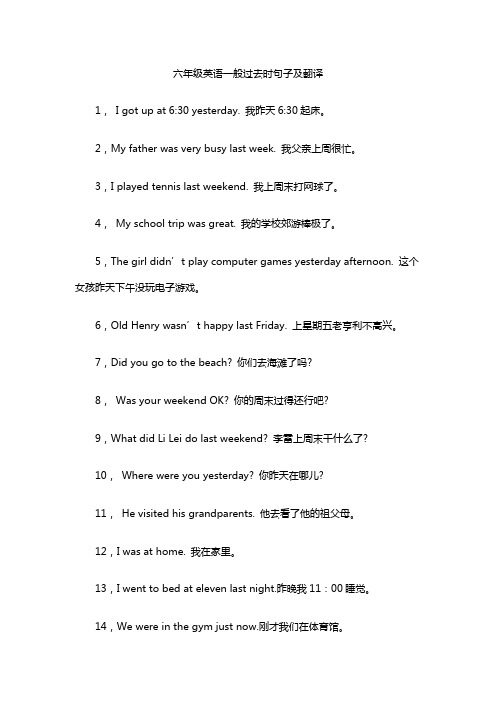
六年级英语一般过去时句子及翻译
1,I got up at 6:30 yesterday. 我昨天6:30起床。
2,My father was very busy last week. 我父亲上周很忙。
3,I played tennis last weekend. 我上周末打网球了。
4,My school trip was great. 我的学校郊游棒极了。
5,The girl didn’t play computer games yesterday afternoon. 这个女孩昨天下午没玩电子游戏。
6,Old Henry wasn’t happy last Friday. 上星期五老亨利不高兴。
7,Did you go to the beach? 你们去海滩了吗?
8,Was your weekend OK? 你的周末过得还行吧?
9,What did Li Lei do last weekend? 李雷上周末干什么了?
10,Where were you yesterday? 你昨天在哪儿?
11,He visited his grandparents. 他去看了他的祖父母。
12,I was at home. 我在家里。
13,I went to bed at eleven last night.昨晚我11:00睡觉。
14,We were in the gym just now.刚才我们在体育馆。
15,I visited my uncle yesterday.昨天我拜访了我的叔叔。
(完整)六年级一般过去时练习题参考答案
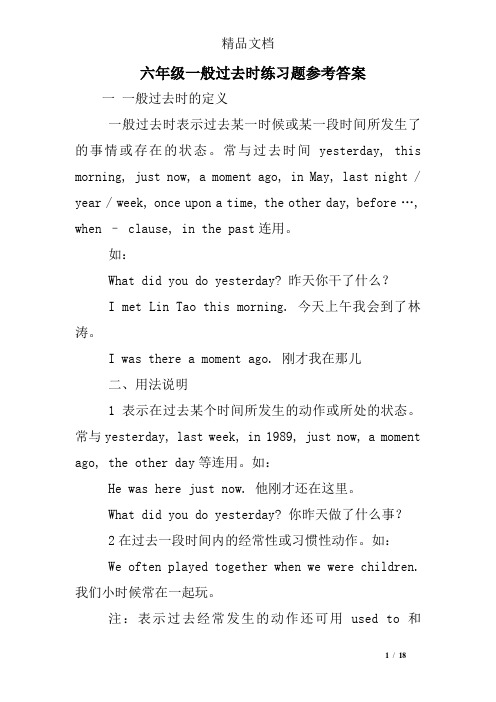
六年级一般过去时练习题参考答案一一般过去时的定义一般过去时表示过去某一时候或某一段时间所发生了的事情或存在的状态。
常与过去时间yesterday, this morning, just now, a moment ago, in May, last night / year / week, once upon a time, the other day, before …, when – clause, in the past连用。
如:What did you do yesterday? 昨天你干了什么?I met Lin Tao this morning. 今天上午我会到了林涛。
I was there a moment ago. 刚才我在那儿二、用法说明1表示在过去某个时间所发生的动作或所处的状态。
常与yesterday, last week, in 1989, just now, a moment ago, the other day等连用。
如:He was here just now. 他刚才还在这里。
What did you do yesterday? 你昨天做了什么事?2在过去一段时间内的经常性或习惯性动作。
如:We often played together when we were children. 我们小时候常在一起玩。
注:表示过去经常发生的动作还可用used to 和would。
如:He used to smoke a lot, but he doesn’t now. 他过去经常抽烟,但现在不抽了。
Whenever we were in trouble, he would help us. 每当我们遇到困难,他都会帮助我们。
3表示主语过去的特征或性格。
如:At that time she was very good at English. 那时她英语学得很好。
4用在状语从句中表示过去将来。
(完整)六年级一般过去时
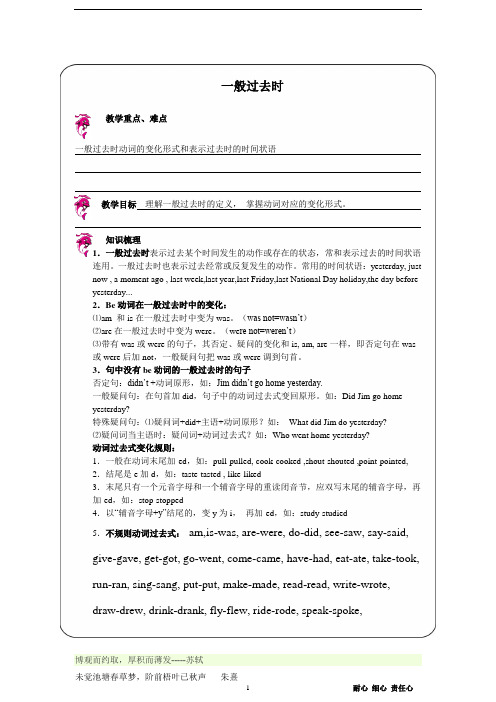
一般过去时教学重点、难点一般过去时动词的变化形式和表示过去时的时间状语教学目标理解一般过去时的定义,掌握动词对应的变化形式。
知识梳理1.一般过去时表示过去某个时间发生的动作或存在的状态,常和表示过去的时间状语连用。
一般过去时也表示过去经常或反复发生的动作。
常用的时间状语:yesterday, just now , a moment ago , last week,last year,last Friday,last National Day holiday,the day before yesterday...2.Be动词在一般过去时中的变化:⑴am 和is在一般过去时中变为was。
(was not=wasn’t)⑵are在一般过去时中变为were。
(we re not=weren’t)⑶带有was或were的句子,其否定、疑问的变化和is, am, are一样,即否定句在was或were后加not,一般疑问句把was或were调到句首。
3.句中没有be动词的一般过去时的句子否定句:didn’t +动词原形,如:Jim didn’t go home yesterday.一般疑问句:在句首加did,句子中的动词过去式变回原形。
如:Did Jim go homeyesterday?特殊疑问句:⑴疑问词+did+主语+动词原形?如:What did Jim do yesterday?⑵疑问词当主语时:疑问词+动词过去式?如:Who went home yesterday?动词过去式变化规则:1.一般在动词末尾加-ed,如:pull-pulled, cook-cooked ,shout-shouted ,point-pointed, 2.结尾是e加d,如:taste-tasted , like-liked3.末尾只有一个元音字母和一个辅音字母的重读闭音节,应双写末尾的辅音字母,再加-ed,如:stop-stopped4.以“辅音字母+y”结尾的,变y为i,再加-ed,如:study-studied5.不规则动词过去式:am,is-was, are-were, do-did, see-saw, say-said, give-gave, get-got, go-went, come-came, have-had, eat-ate, take-took, run-ran, sing-sang, put-put, make-made, read-read, write-wrote,draw-drew, drink-drank, fly-flew, ride-rode, speak-spoke,sweep-swept, swim-swam, sit-sat ,become-became,take-took,can-could,swim-swam, bring-brought,drive-drove典型例题过去时练习:写出下列动词的过去式is\am_________ fly_______ plant________ are ________ drink_________play_______ go________ make ________ does_________ dance________ worry________ ask _____ taste_________ eat__________ draw________put ______ throw________ kick_________ pass_______ do ________Be动词的过去时练习一、用be动词的适当形式填空。
六年级一般过去时

just now 刚才
• • 主语+谓语 •
• •
be动词(was,were) 助动词(did) 情态动词(could,might) 实义动词(有确切含义的动词,可
以单独做谓语,如:played 等)
例如: • They were happy. • He played football. • You did your homework.
used lived woke kept said cleaned bought played learnt/ed saw read stopped
ran run borrow borrowed grew grow watch watched wrote write smiled smile
open begin swim carry study finish
一般过去时
1.定义: 一般过去时态表示过去某个时 间发生的动作或存在的状态,在表 示过去一段时间内经常或反复发 生的动作或习惯状态,也用一般 过去时,在一般过去时,动词用 其过去式形式,不受主语人称和 数变化的影响。
谓语变化
规则动词过去式的构成
1、一般词尾加-ed。 stay→stayed help -- helped ask -- asked look→looked 2、e结尾的只加-d。 hope→hoped dance -- danced love -- loved live→lived
• III.句型转换 – They came to China in 1990.(变一般疑问句) Did come • __________ they ________ to China in 1990? • 2.I was ill for two days last week? (同上) • ________ Were you ill for two days last week? • 3. The twins go to school on foot every day. (同上) Do go • _________ the twins _______ to school on foot every day? • 4.She washed the clothes last Sunday. ( 变否定句) wash the clothes last Sunday • She _________ ________ didn’t
一般过去时_小学六年级英语
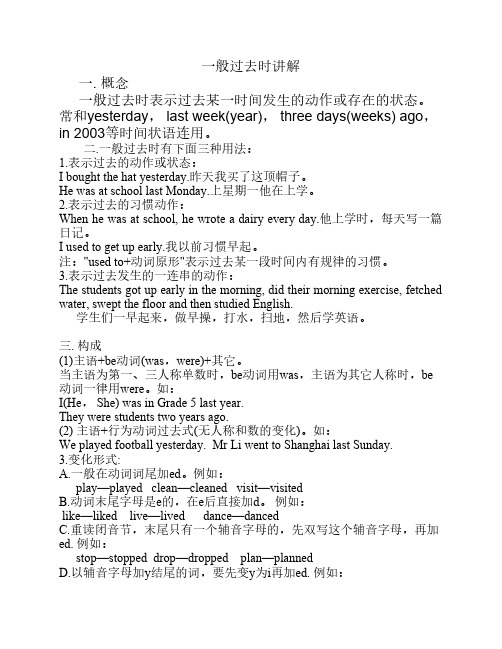
一般过去时讲解一. 概念一般过去时表示过去某一时间发生的动作或存在的状态。
常和yesterday, last week(year), three days(weeks) ago,in 2003等时间状语连用。
二.一般过去时有下面三种用法:1.表示过去的动作或状态:I bought the hat yesterday.昨天我买了这顶帽子。
He was at school last Monday.上星期一他在上学。
2.表示过去的习惯动作:When he was at school, he wrote a dairy every day.他上学时,每天写一篇日记。
I used to get up early.我以前习惯早起。
注:"used to+动词原形"表示过去某一段时间内有规律的习惯。
3.表示过去发生的一连串的动作:The students got up early in the morning, did their morning exercise, fetched water, swept the floor and then studied English.学生们一早起来,做早操,打水,扫地,然后学英语。
三. 构成(1)主语+be动词(was,were)+其它。
当主语为第一、三人称单数时,be动词用was,主语为其它人称时,be 动词一律用were。
如:I(He, She) was in Grade 5 last year.They were students two years ago.(2) 主语+行为动词过去式(无人称和数的变化)。
如:We played football yesterday. Mr Li went to Shanghai last Sunday.3.变化形式:A.一般在动词词尾加ed。
例如:play—played clean—cleaned visit—visitedB.动词末尾字母是e的,在e后直接加d。
小学六年级语法一般过去时
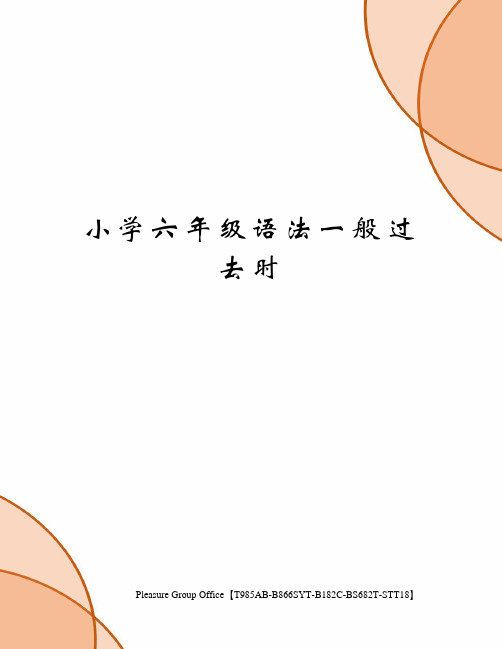
小学六年级语法一般过去时Pleasure Group Office【T985AB-B866SYT-B182C-BS682T-STT18】教案学设计一般过去时1.一般过去时表示过去某个时间发生的动作或存在的状态,常和表示过去的时间状语连用。
一般过去时也表示过去经常或反复发生的动作。
常用的时间状语:yesterday, just now , a moment ago , last week,last year,last Friday,last National Day holiday,the day before yesterday... 2.Be动词在一般过去时中的变化:⑴am 和is在一般过去时中变为was。
(was not=wasn’t)⑵are在一般过去时中变为were。
(were not=weren’t)⑶带有was或were的句子,其否定、疑问的变化和is, am, are一样,即否定句在was或were后加not,一般疑问句把was或were调到句首。
3.句中没有be动词的一般过去时的句子否定句:didn’t +动词原形,如:Jim didn’t go home yesterday.一般疑问句:在句首加did,句子中的动词过去式变回原形。
如:Did Jim go home yesterday特殊疑问句:⑴疑问词+did+主语+动词原形如: What did Jim do yesterday⑵疑问词当主语时:疑问词+动词过去式如:Who went home yesterday动词过去式变化规则:1.一般在动词末尾加-ed,如:pull-pulled, cook-cooked ,shout-shouted ,point-pointed,2.结尾是e加d,如:taste-tasted , like-liked3.末尾只有一个元音字母和一个辅音字母的重读闭音节,应双写末尾的辅音字母,再加-ed,如:stop-stopped4.以“辅音字母+y”结尾的,变y为i,再加-ed,如:study-studied5.不规则动词过去式: am,is-was, are-were, do-did, see-saw, say-said, give-gave, get-got, go-went, come-came, have-had, eat-ate, take-took, run-ran, sing-sang, put-put, make-made, read-read, write-wrote, draw-drew, drink-drank, fly-flew, ride-rode, speak-spoke, sweep-swept, swim-swam, sit-sat ,become-became, take-took,can-could,swim-swam, bring-brought,drive-drove过去时练习:写出下列动词的过去式is\am_________ fly_______ plant________ are ________ drink_________play_______ go________ make ________ does_________ dance________worry________ ask _____ taste_________ eat__________ draw________put ______ throw________ kick_________ pass_______ do ________Be动词的过去时练习一、用be动词的适当形式填空。
小学六年级英语【一般过去时的用法】

一般过去时的用法一、概念表示在的过去某个时间里所发生的动作或存在的状态。
通常在句子里找到表示过去时间的词或词组。
如:yesterday,yesterday morning,yesterday afternoon,yesterday evening,the day before yesterday(前天),last night,last week,last month,last year,a momentago(刚才),just now(刚才),two days ago,a week ago,in 1990等。
如:I went to bed at eleven last night.昨晚我11:00睡觉。
四、动词过去式的构成规律(一)规则动词的过去式1.一般情况下,在动词原形后面加-ed;look→lookedplay→playedstart→startedvisit→visited2.以不发音e结尾的动词,在词尾直接加-d;live→liveduse→used3.以“辅音字母+ y”结尾的动词,先将y改为i ,再加–ed;study→studied, try→triedfly→flied4.以重读闭音节(即辅音+元音+辅音)或r音节结尾,末尾只有一个辅音字母的动词,要先双写这个辅音字母后,再加–ed。
stop→stoppedplan→planned, prefer→preferred(二)不规则动词的过去式1.改变动词中的元音;begin→begandrink→drankcome→cameeat→ategrow→grewrun→ranknow→kn ewwin→wonspeak→spoketake→tookwrite→wroteget→got2.变词尾的–d为–t;build→builtlend→lentsend→sentspend→spentbend→bent3.与动词原形一样;cut→cutput→putcost→costhurt→hurtshut→shut4.变-ay为-aid (少数动词);say→saidpay→paidlay→laid5.采用不同词根;sell→soldteach→taughtbuy→bought6.其他。
小学六年级一般过去时简单总结

一般过去时1.一般过去时表示过去某个时间发生的动作或存在的状态,常和表示过去的时间状语连用。
如:last week , last year , yesterday 等,也可以表示过去经常发生的动作,常和often,always 等频率副词连用。
例如:I saw him in the supermarket yesterday. 昨天我在超市里看见他了。
Mike always went to school on foot last term. 上学期迈克总是步行上学。
2.句型:询问在过去的某一个时间做了什么,借助助动词did 。
特殊疑问句——What did you do yesterday / last weekend ? ——I did my homework .一般疑问句,把did提前——Did you help your parents clean the room ? ( 当句子变为一般疑问句,动词应还原成动词原形) ——Yes , I did ./No, I didn’t .一般过去时1. 一般过去时表示过去某个时间发生的动作或存在的状态,常和表示过去的时间状语连用。
如:last week , last year , yesterday 等,也可以表示过去经常发生的动作,常和often,always 等频率副词连用。
例如:I saw him in the supermarket yesterday. 昨天我在超市里看见他了。
Mike always went to school on foot last term. 上学期迈克总是步行上学。
2.句型:询问在过去的某一个时间做了什么,借助助动词did 。
特殊疑问句——What did you do yesterday / last weekend ? ——I did my homework .一般疑问句,把did提前——Did you help your parents clean the room ? ( 当句子变为一般疑问句,动词应还原成动词原形) ——Yes , I did ./No, I didn’t .。
小学六年级英语一般过去时的用法总结
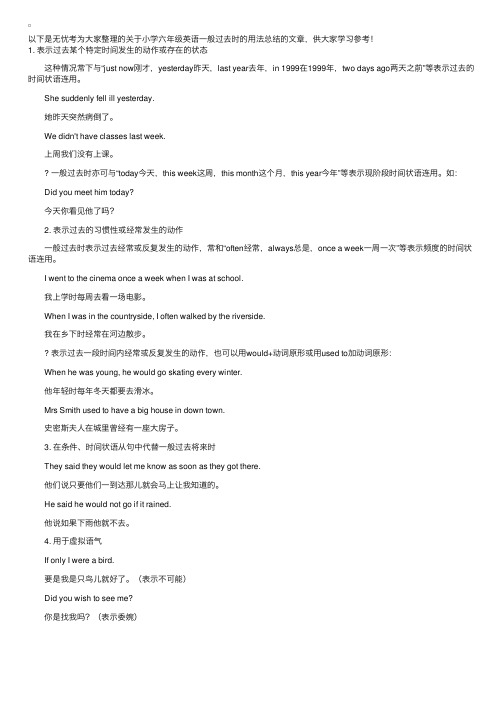
以下是⽆忧考为⼤家整理的关于⼩学六年级英语⼀般过去时的⽤法总结的⽂章,供⼤家学习参考!1. 表⽰过去某个特定时间发⽣的动作或存在的状态 这种情况常下与“just now刚才,yesterday昨天,last year去年,in 1999在1999年,two days ago两天之前”等表⽰过去的时间状语连⽤。
She suddenly fell ill yesterday. 她昨天突然病倒了。
We didn't have classes last week. 上周我们没有上课。
? ⼀般过去时亦可与“today今天,this week这周,this month这个⽉,this year今年”等表⽰现阶段时间状语连⽤。
如: Did you meet him today? 今天你看见他了吗? 2. 表⽰过去的习惯性或经常发⽣的动作 ⼀般过去时表⽰过去经常或反复发⽣的动作,常和“often经常,always总是,once a week⼀周⼀次”等表⽰频度的时间状语连⽤。
I went to the cinema once a week when I was at school. 我上学时每周去看⼀场电影。
When I was in the countryside, I often walked by the riverside. 我在乡下时经常在河边散步。
? 表⽰过去⼀段时间内经常或反复发⽣的动作,也可以⽤would+动词原形或⽤used to加动词原形: When he was young, he would go skating every winter. 他年轻时每年冬天都要去滑冰。
Mrs Smith used to have a big house in down town. 史密斯夫⼈在城⾥曾经有⼀座⼤房⼦。
3. 在条件、时间状语从句中代替⼀般过去将来时 They said they would let me know as soon as they got there. 他们说只要他们⼀到达那⼉就会马上让我知道的。
- 1、下载文档前请自行甄别文档内容的完整性,平台不提供额外的编辑、内容补充、找答案等附加服务。
- 2、"仅部分预览"的文档,不可在线预览部分如存在完整性等问题,可反馈申请退款(可完整预览的文档不适用该条件!)。
- 3、如文档侵犯您的权益,请联系客服反馈,我们会尽快为您处理(人工客服工作时间:9:00-18:30)。
一般过去时教学重点、难点一般过去时动词的变化形式和表示过去时的时间状语教学目标理解一般过去时的定义,掌握动词对应的变化形式。
知识梳理1.一般过去时表示过去某个时间发生的动作或存在的状态,常和表示过去的时间状语连用。
一般过去时也表示过去经常或反复发生的动作。
常用的时间状语:yesterday, just now , a moment ago , last week,last year,last Friday,last National Day holiday,the day before yesterday...2.Be动词在一般过去时中的变化:⑴am 和is在一般过去时中变为was。
(was not=wasn’t)⑵are在一般过去时中变为were。
(we re not=weren’t)⑶带有was或were的句子,其否定、疑问的变化和is, am, are一样,即否定句在was或were后加not,一般疑问句把was或were调到句首。
3.句中没有be动词的一般过去时的句子否定句:didn’t +动词原形,如:Jim didn’t go home yesterday.一般疑问句:在句首加did,句子中的动词过去式变回原形。
如:Did Jim go homeyesterday?特殊疑问句:⑴疑问词+did+主语+动词原形?如:What did Jim do yesterday?⑵疑问词当主语时:疑问词+动词过去式?如:Who went home yesterday?动词过去式变化规则:1.一般在动词末尾加-ed,如:pull-pulled, cook-cooked ,shout-shouted ,point-pointed, 2.结尾是e加d,如:taste-tasted , like-liked3.末尾只有一个元音字母和一个辅音字母的重读闭音节,应双写末尾的辅音字母,再加-ed,如:stop-stopped4.以“辅音字母+y”结尾的,变y为i,再加-ed,如:study-studied5.不规则动词过去式:am,is-was, are-were, do-did, see-saw, say-said, give-gave, get-got, go-went, come-came, have-had, eat-ate, take-took, run-ran, sing-sang, put-put, make-made, read-read, write-wrote,draw-drew, drink-drank, fly-flew, ride-rode, speak-spoke,sweep-swept, swim-swam, sit-sat ,become-became,take-took,can-could,swim-swam, bring-brought,drive-drove典型例题过去时练习:写出下列动词的过去式is\am_________ fly_______ plant________ are ________ drink_________play_______ go________ make ________ does_________ dance________ worry________ ask _____ taste_________ eat__________ draw________put ______ throw________ kick_________ pass_______ do ________Be动词的过去时练习一、用be动词的适当形式填空。
1. I ______ an English teacher now.2. She _______ happy yesterday.3. They _______ glad to see each other last month.4. Helen and Nancy ________ good friends.5. The little dog _____ two years old this year.6. Look, there ________ lots of grapes here.7. There ________ a sign on the chair on Monday.8. Today _____ the second of June. Yesterday ______ the first of June. It _____ Children’s Day. All the students ______ very excited.当堂检测二、句型转换。
1. There was a car in front of the house just now.否定句:________________________________________________一般疑问句:____________________________________________肯、否定回答:__________________________________________2.I went to the park last weekend.(改为一般疑问句) ________________________________________________________ (改为否定句)_________________________________________________________ 三、中译英。
1.我的故事书刚才还在手表旁边。
___________________________________________________________2.他们的外套上个礼拜放在卧室里了。
___________________________________________________________3.一会以前花园里有两只小鸟。
___________________________________________________________行为动词的过去时练习一、用be动词的适当形式填空。
1. I ______ (watch) a cartoon on Saturday.2. Her father _______ (read) a newspaper last night.3. We _________ to zoo yesterday, we _____ to the park. (go)4. ______ you _______ (visit) your relatives last Spring Festival?5. ______ he _______ (fly) a kite on Sunday? Yes, he ______.6. Gao Shan _______ (pull) up carrots last National Day holiday.7. I ____________ (sweep) the floor yesterday, but my mother ______.8. What ______ she _______ (find) in the garden last morning? She __________ (find) a beautiful butterfly.二、句型转换。
1. They played football in the playground.否定句:________________________________________________一般疑问句:____________________________________________肯、否定回答:__________________________________________过去时综合练习(1)一、用动词的适当形式填空。
1. It ______ (be) Ben’s birthday last Friday.2. We all ______ (have) a good time last night.3. He ________ (jump) high on last Sports Day.4. Helen ________ (milk) a cow on Friday.5. She likes ______ newspapers, but she ______ a book yesterday. (read)6. He _______ football now, but they _______ basketball just now. (play)7. Jim’s mother _________ (plant) trees just now.8. _______ they ________ (sweep) the floor on Sunday? No, they _____.9. I _______ (watch) a cartoon on Monday.10. We ___________ (go) to school on Sunday.过去时综合练习一、用动词的适当形式填空。
1. It _____ (be) the 2nd of November yesterday. Mr White ________ (go) to his office by car.2. Gao Shan ________ (put) the book on his head a moment ago.3. Don’t ______ the house. Mum _______ it yesterday. (c lean)4. What ____ you ______ just now? I _______ some housework. (do)5. They _________ (make) a kite a week ago.6. I want to ______ apples. But my dad _______ all of them last month. (pick)7. _______ he ______ the flowers this morning? Yes, he _____. (water)8. She ____ (be) a pretty girl. Look, she _____ (do) Chinese dances.9. The students often _________ (draw) some pictures in the art room.10.What ______ Mike do on the farm? He ________ cows. (milk)二、中译英。
